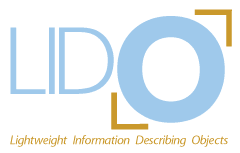Use in a Web Browser
Go to “LIDO Terminology – LOD Interface”
Document requests from web browsers usually contain a statement such as Accept: text/html in the HTTP header. Whenever a LIDO Terminology URI is requested in this way, the resolver will redirect the request to an HTML rendering of the desired resource.
Base namespace
Requesting the namespace URI without further information redirects to the main page of xTree.public. This page includes a list of available LIDO Terminology concept schemes.
http://terminology.lido-schema.org
Vocabulary URIs
Each concept scheme within the LIDO Terminology is identified by its vocabulary name. In combination with the base URI, this results in the concept scheme URI. Invoking a concept scheme URI in a web browser redirects to an xTree.public HTML page with concept scheme metadata.
http://terminology.lido-schema.org/repositorySet_type or
http://terminology.lido-schema.org/eventType
Canonical URIs
A canonical URI (if defined) will redirect a web browser to the corresponding page in xTree.public
http://terminology.lido-schema.org/lido00023 or
http://terminology.lido-schema.org/lido00132
Symbolic URIs
A symbolic URI is composed of the concept scheme URI and a symbolic name. Web browsers will be redirected to the corresponding page in xTree.public.
http://terminology.lido-schema.org/eventType/type_assignment or
http://terminology.lido-schema.org/termMaterialsTech_type/material
SPARQL
Requesting the SPARQL endpoint from a web browser will open a web-based editor for interactive exploration of the LIDO terminology RDF store:
